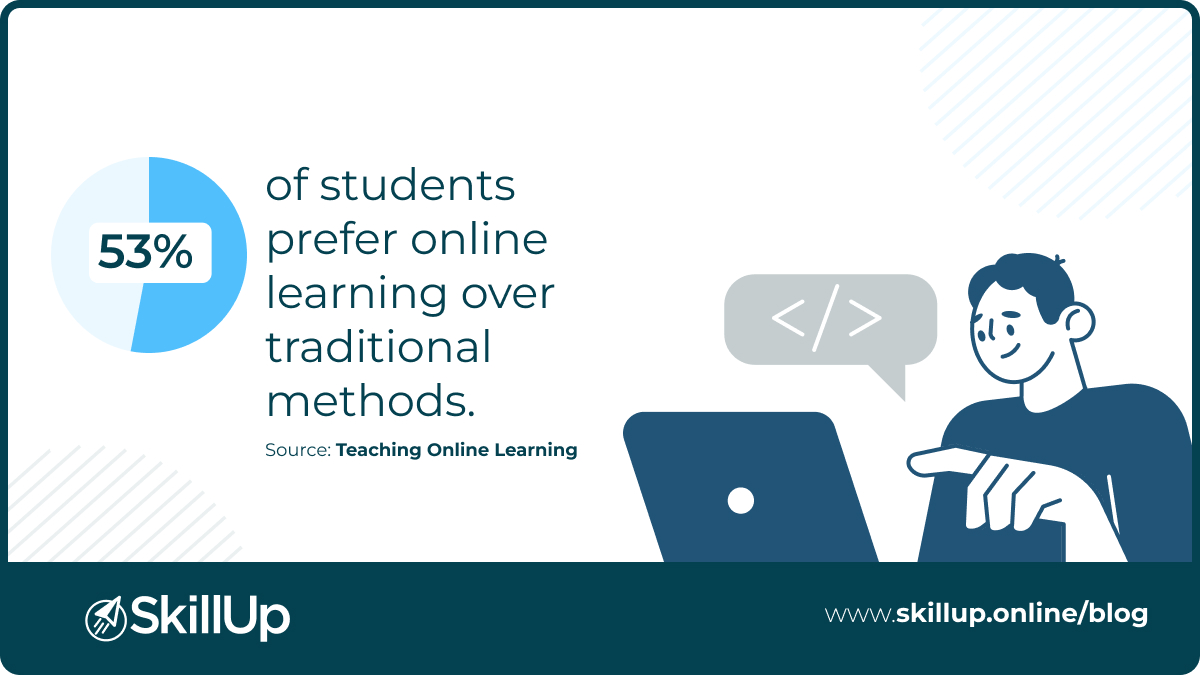If you work in or are currently a student of Information Technology, chances are you’re getting bombarded with ads for the most recent batch of IT certifications almost daily. “Accelerate your IT career here!”, “Multiply your earnings with an online certification here!”, and so on.
Often, these types of ads come through social media from a recognized Ivy League college or your alma mater. And what’s not to love? Who doesn’t want a new Harvard, MIT, or Yale endorsed IT certificate? If you’re at the stage where you’re seriously looking for ways to advance your IT career though, these ads can be confusing. What exactly does each one offer and what’s the difference between these and the courses you might find through an online platform such as SkillUp Online or even a local institution offering online certifications? Is the cost difference justifiable or are you just paying for a name?
In this article, we’ll dissect the topic of online Ivy League IT certifications vs… well, everything else. That includes the differences, similarities, and deciding factors that may help decide which one is right for you. Our goal is to help you make a more informed decision; one that hopefully leads to a better outcome for you, the learner.
First things first, if you’re new to the field of IT, it may not be immediately clear that, regardless of the school you attend (Ivy League or Otherwise), IT certifications are mostly driven by the sponsoring company. If you’re going for a Microsoft Azure Certification, then the majority of the content and delivery model is determined by Microsoft not the Ivy League institution. Foundation level courses in AI, Data Science, and the like are starting to pop up. But by and large, this is the status quo. 
As a result and when deciding on an IT certification, you’re really making a decision on how you want to receive that information not the quality of its content. Harvard’s actual curriculum, for instance, won’t vary too much in scope from your local community college in this regard and where certifications are concerned. This is not to say that they haven’t made tweaks; the base content is the same however and an applied learner can come out with the same general knowledge.
Understanding this leaves three critical questions that – when answered – should significantly impact your decision making process on where to go for your IT certification. They are:
- The program’s flexibility to fit your real-world expectations like job, family, work-life balance, transportation, etc.
- The effectiveness of the program to successfully drive students to completion. IT programs have high drop-out rates. Which program is going to be most successful at getting you to the finish line?
- What the post-completion support network looks like.
Let’s dive in.
1. Flexibility
As a rule, online IT certifications utilize technology to facilitate distance learning. A majority of those going for new certificates are already working professionals though and coursework is generally planned on a flexible schedule. How flexible is another matter altogether.
Before getting started, you’ll want to take a deep dive into the study materials and course timeline. Obvious considerations include your work and family life. Make sure you also account for travel time, extracurricular activities, and ; our goal is to pick a program that will help us avoid burnout. You should be looking for flexible deadlines for tests and assignments. These factors are often much more pertinent to your success that whether the course you’re taking is an ivy league certification or not.
Some online platforms even offer language flexibility for people who aren’t native English speakers. You can find courses in up to 11 different instructional languages to accommodate IT professionals from diverse locations across the world including SkillUp Online
2. Effectiveness of the program in driving students to completion
You need to consider what the instructor support, classroom projects, learning tools, and other support networks look like. The cost of a program, both for Ivy League certifications and other online platforms usually has a hand on the overall value you are likely to get. Some of the factors you may need to look into here include;
Blended Learning
While IT certifications are available in brick and mortar classrooms, for obvious reasons, they aren’t generally the choice for those considering an ivy league IT certificate. eLearning is certainly convenient, but as usual, the devil is in the details. Courses like AI, NLP, and Data Science can be very dense and for most learners require added layers of instructor support beyond study guides and email homework packets.

Because of that, the blended (or hybrid) learning model has come into popular use in the IT space. Blended learning centers around the student’s individual learning needs, leveraging tools like rich and interactive media, one-on-one sessions with professors, and real-time study environments to augment and support the online learning process. The difference between eLearning and blended learning can be stark, with IT courses taught in the blended learning style graduating up to 90% of enrollees.
Collaborative & Interactive Learning
Similarly, research indicates that learning is more effective when students collaborate and are able to gain peer feedback and support. Be careful when signing up for an Ivy League certificate course that you’re not giving up these valuable collaborative experiences in exchange for a name. If you don’t get the support you need to pass, it won’t matter where the certificate is from.
Both Ivy League IT certifications and other online IT platforms have come up with synchronous and asynchronous ways that students can collaborate. These could be through group projects or discussion groups and many use popular business tools like Slack, Google Hangouts, and other tools you’ll likely be familiar with to do it.
A subtle benefit of these online discussion groups is the leveling of the playing field for quiet students or those from marginalized groups.
Pace of the Industry
As an IT student or professional you know how quickly the industry is changing. Before getting started you need to go through course expectations, learning objectives, and procedures. Ivy League IT certification courses usually have clear learning goals from the start, but course content and instructors should be updated regularly if you’re going to graduate with a comprehensive understanding of the subject matter. Certificates, from an Ivy League school – or elsewhere, don’t guarantee success.
Other IT learning platforms like Skillup Online collaborate directly with industry leaders like IBM Microsoft and Google to deliver the most relevant materials in proven IT focused learning modalities. This helps them drive better developed and more successful learner outcomes.
Support
Nobody’s keen on the idea of getting an IT certification that will just lie in their house. You’re looking for skills that will help you get a new job or accelerate your IT career. It’s essential to review how past IT students rate your prospective college or course platform in this area. Do they help you get placement, or do they just award you a certificate and that is the last you will hear from them?
Placement
Ivy League schools and local colleges often have a career services department that will help with placement after completion. Students may also benefit from career fairs, occasional job callouts through their faculties, internships as well as industry visits. Often times educational programs that deal specifically in the IT space however are able to develop a more meaningful relationship with a wider selection of potential employers in tech.
Job opportunities
So, how much does an IT certificate’s origins matter to a prospective employer? Often, the answer is “not much”. Since almost all IT Certificate courses are accredited by the sponsoring commercial institution rather than an institutional board, employers are generally more focused on whether you’ve satisfied the requirements of the certificate’s progenitor.
The IT industry is growing at a remarkable clip and only projected to continue doing so for the next ten years. Demand is high and those looking to invest in their careers with certificates are likely to see the benefits sooner rather than later. That means that employers are likely to be less concerned with whether you have an Ivy League IT certificate than ensuring your expertise on a specific platform, tool, or language.

CEO, SkillUp Group




